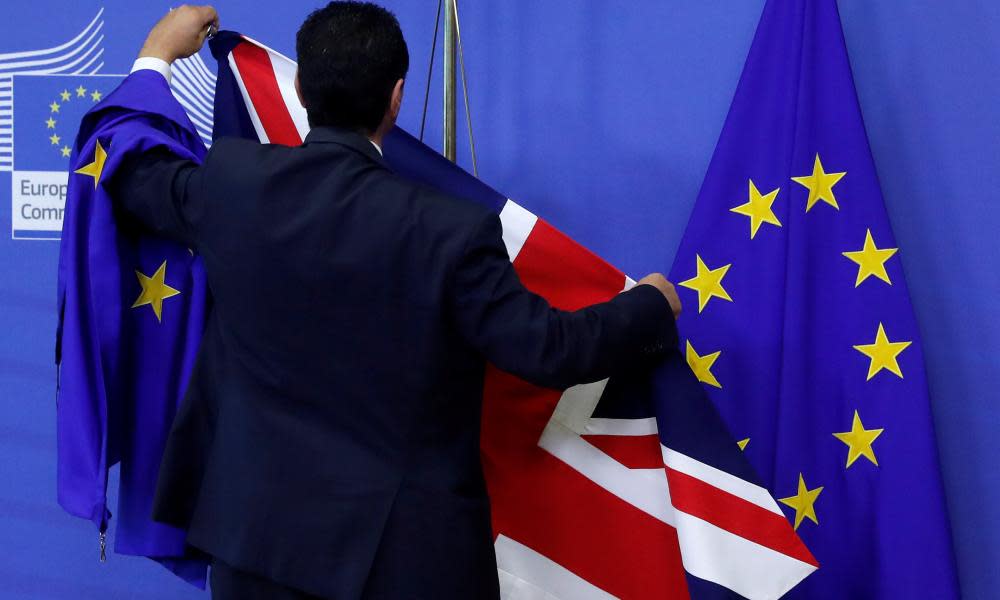Britain's post-Brexit customs plan draws dismissive EU response

A European minister has poured cold water on Britain’s hopes of being able to sign trade deals during a Brexit transition period, as EU leaders gave a cool response to the UK’s opening gambit for trade negotiations.
The British government published proposals on Tuesday for “a new customs arrangement that facilitates the freest and most frictionless trade possible in goods between the UK and the EU”.
The British policy paper calls for “a continued close association with the EU customs union for a time-limited period after the UK has left the EU” in March 2019. It also makes clear Britain intends to forge ahead with trade talks with other countries, but acknowledges that any new arrangements would have to respect the EU’s transition terms.
The Czech secretary of state for EU affairs, Aleš Chmelař, suggested his government would not tolerate the UK being able to make trade deals during a transition period.
“I do believe it is not possible to have the same advantages and less obligations in general,” he told the Guardian. “This is a very clear thing, And it applies also with the custom union and any other deal that is somehow bound with it. So with any step in terms of market integration, market access, there is a set of obligations. This is very clear.”
Michel Barnier, the EU’s chief negotiator, used the publication of the UK customs paper to increase the pressure on London to settle Brexit divorce issues.
“The quicker #UK & EU27 agree on citizens, settling accounts and #Ireland, the quicker we can discuss customs & future relationship,” he tweeted.
The EU has insisted that the UK must make “sufficient progress” on these three issues before it will open talks on trade and the future relationship – a timetable the UK’s Brexit minister, David Davis, accepted at the start of Brexit negotiations in June.
EU members (plus Turkey, Andorra, Monaco and San Marino) trade without customs duties, taxes or tariffs between themselves, and charge the same tariffs on imports from outside the EU. Customs union members cannot negotiate their own trade deals outside the EU, which is why leaving it – while hopefully negotiating a bespoke arrangement – has been one of the government’s Brexit goals. See our full Brexit phrasebook.
Barnier will report to EU leaders in October on whether the UK has made “sufficient progress” to allow opening trade talks.
The policy paper reveals the UK government is looking at two models on customs, both of which replicate the status quo to a significant extent. The first is described as “a highly streamlined customs arrangement” , which would require technology to ease the flow of goods over borders and securing a waiver on key paperwork. The second is described as “a new customs partnership with the EU”, whereby the UK would adopt EU rules on imports heading to the bloc.
Guy Verhofstadt, the European parliament’s lead coordinator on Brexit, gave the proposals a cool response. “To be in & out of the customs union & ‘invisible borders’ is a fantasy,” he tweeted. He also echoed Barnier’s line that the UK needed to secure a deal on citizens rights’ and the financial settlement, before embarking on trade talks.
A European commission spokesman added that the EU was working on its own paper on “customs issues” before the next round of Brexit talks at the end of August.
“We see the UK’s publication of a series of position papers as a positive step towards now really starting phase one of the negotiations. The clock is ticking and this will allow us to make progress,” he said.
“We will now study the UK position paper on customs carefully in the light of the European council guidelines and the council’s negotiating directives,” he added, referring to the negotiating red lines drawn up by EU leaders that was turned into a technical document by senior officials and ministers.
“We take note of the UK’s request for an implementing period and its preferences as regards the future relationship, but we will only address them once we have made sufficient progress on the terms of the orderly withdrawal,” the spokesman said.
“An agreement on a future relationship between the EU and the UK can only be finalised once the UK has become a third country.”
He added: “As Michel Barnier has said on several occasions, ‘frictionless trade’ is not possible outside the single market and customs union.”

 Yahoo News
Yahoo News 
